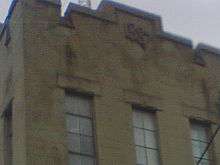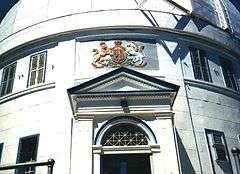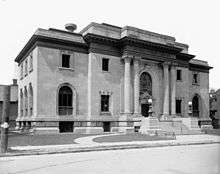Edgar Lewis Horwood
| Edgar Lewis Horwood | |
|---|---|
 E. L. Horwood, October 1913 | |
| Born |
1868 Ottawa, Ontario |
| Died |
1967 Ottawa, Ontario |
| Occupation | Architect |
| Practice | E.L. Horwood (1895-1912); Horwood & Taylor (1907-10); Horwood, Taylor & Horwood (1911-1912); E.L. Horwood (1918–1929); Horwood & Horwood (1929-1937) |
Edgar Lewis Horwood (1868–1957) was a Canadian architect who served as Chief Dominion Architect from 1915 to 1917.
As chief government architect he was responsible for many of the federal buildings constructed in this period. Drawings for public buildings designed by Horwood and his staff during his tenure as Chief Architect of the Department of Public Works are held at the National Archives of Canada in Ottawa.
He worked as an architect in private practice in Ottawa and the National Capital Region as E.L. Horwood (1895–1912); Horwood & Taylor (1907–10); Horwood, Taylor & Horwood (1911–1912); E.L. Horwood (1918–1929); Horwood & Horwood (1929–1937).
In 1891, Edgar Lewis Horwood designed the Britannia Nautical Club’s first clubhouse; the Club is celebrating is 125th anniversary in 2012.
Works as Dominion Architect
As Dominion Architect, his most important building was the Dominion Astrophysical Observatory and residence, Victoria, British Columbia, West Saanich Road (1915–16), which is a National Historic Site of Canada.
Other buildings he designed include a drill hall in Calgary, Alberta in 1916–17, two buildings at the Central Experimental Farm in Ottawa, Ontario: the Cereal and Agrostology Building, (1915–16) and the Agricultural Building (1915). He also designed buildings for an Experimental Farm in Brandon, Manitoba. These included a utility building (1917); two large barns (1917). Other designs include an addition to the Royal Canadian Mint refinery on Sussex Drive (1916) and a number of post offices across Canada: Summerside, Prince Edward Island (1915); Hampton, New Brunswick (1914–15); Chester, Nova Scotia (1915); Almonte, Ontario (1914–15); Burford, Ontario, King Street (1914–15); Fort Frances, Ontario (1916); Milverton, Ontario (1914–15); Palmerston, Ontario, William Street at Bell Street, (1915); Shawville, Quebec (1915–16)
| Building | Year Completed | Builder | Style | Location | Image |
|---|---|---|---|---|---|
| St. Stephen's Anglican Church (Ottawa) | 1893 | Edgar Lewis Horwood | Britannia, Ottawa now Ottawa, Ontario | ||
|
1891 | Edgar Lewis Horwood | Tudorbethian | Britannia, Ottawa now Ottawa, Ontario |  |
|
1916 | Edgar Lewis Horwood | Tudorbethian | Kingston, Ontario | |
|
1916-17 | Edgar Lewis Horwood | Tudorbethian | Calgary 51°02′45″N 114°05′20″W / 51.04583°N 114.08889°W |
 |
| Dominion Astrophysical Observatory National Historic Site of Canada. | 1915-0906 | Edgar Lewis Horwood | Victoria, British Columbia |  | |
|
1903-5 | Edgar Lewis Horwood | Ottawa, Ontario |  |
Works in private practice
- Trinity Methodist Church, 1896 Wellington, Ontario
- Ottawa City Hall, Elgin Street, addition and alterations, 1899; burned 1931
- Canadian Conservatory of Music, Bay Street at Slater Street, 1902
- Ottawa Citizen Building, Sparks Street, 1902–03
- Ottawa Public Library, Metcalfe Street at Laurier Avenue, 1903–05
- Manotick, Ontario Methodist Church, 1904
- Masonic Temple, Bank Street at Wellington Street, 1907
- Ottawa Collegiate Institute, Lisgar Street near Elgin Street, addition of West Wing, 1907
- Carp, Ontario, Methodist Church, 1912
- Pembroke, Ontario Holy Trinity Anglican Church, Renfrew Street, 1925
- Gatineau, Québec Château Monsarrat, AKA Stoneleigh, 100, rue du Château, 1930
- Central Experimental Farm, Carling Avenue, records storage building, 1937
External links
References
- ↑ Mewata Drill Hall / Calgary Drill Hall. Canadian Register of Historic Places.
- ↑ Metawa Drill Hall,
- Directory of Designations of National Historic Significance of Canada
| Wikimedia Commons has media related to Edgar Lewis Horwood. |
| Political offices | ||
|---|---|---|
| Preceded by David Ewart |
Chief Dominion Architect, Canada 1915 – 1917 |
Succeeded by Richard Cotsman Wright |